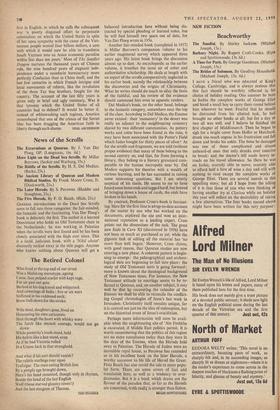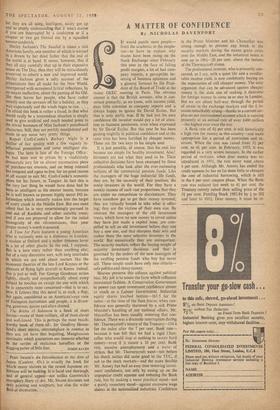NEW FICTION
Beachworthy
el The Brides of Solomon. By Geoffrey Household.
(Michael Joseph, 13s. 6d.) I HAVE a friend who was educated at King's College, Cambridge, and is always zealous that this fact should be worthily reflected in his choice of holiday reading. One summer he bore to Ischia the complete works of George Eliot and hired a small boy to carry them round behind him wherever he went. Fearful that he should be distracted from his allotted task, he had brought no other books at all; but for a day or two all was well, and I believe he finished the first chapter of Middlemarch. Then he began tO sigh for a bright cover from Helfer or Hatchard, drank too much cognac in his frustration and fell down and broke his ankle. The bone he damaged was one of those complicated and almost unheard-of ones that only drunks ever contrive to break; and the doctor's bill made heavy in- roads on his travel allowance. So there he was on Ischia, scarcely able to move, scarcely able to afford half a litre of wine a day and still with nothing to read except the complete works of George Eliot. There are several morals to this appalling story; but all I hope from the telling of it is that those of you who were thinking of having another try at Clarissa while on holiday this year will reflect on the desirability of taking a few alternatives. The four books named above might have been written for this very purpose :
for they are all witty, intelligent, nicely got up and so utterly undemanding that it won't matter if you are interrupted by a sandstorm or if a chapter or two get blotted out by a squashed tomato sandwich.
Shirley Jackson's The Sundial is about a rich American family, one member of which is warned
in a dream by her dead father that the end of the world is at hand. It seems, however, that if they all stay carefully shut up in their expensive house on The Day, then they will be miraculously
preserved to inherit a new and improved world. Shirley Jackson gives a salty account of the
Preparations they all make for the New World, interspersed with occasional lyrical reflections, by no means ineffective, about the passing of the Old. She then leaves her people, who have rather meanly sent the servants off for a holiday, as they Wait expectantly and the winds begin to rise. . . . in afraid this book is rather a fraud, in that what Would really be a tremendous situation is simply used to give artificial and much needed point to the trivial humours of Miss Jackson's pasteboard characters. Still, they are prettily manipulated and made to say some very pretty things.
Rupert Croft-Cooke's Barbary Night is a thriller of fair quality with a few vaguely in- tellectual pretensions and some intelligent dia- logue. The hero is late of the Foreign Office :
he had been sent to prison by a vindictively democratic jury for an almost unconscious piece of Purchase-tax evasion, and on being released has resigned and came to live, for no good reason at all except to suit Mr. Croft-Cooke's romantic Plans for his future, in Tangier. In fact this is the very last thing he would have done had he been as intelligent as his creator insists, because he is well known to possess highly secret FO in- formation which instantly makes him the target of every crook in the Middle East. But one must admit that he is very entertainingly pursued in and out of Kasbahs and other suitable areas; and if you are prepared to allow for the initial incongruity of the circumstances, then your Proper money's-worth is assured.
A Time for Paris features a young American Who is variously seen as a diplomat in London,
a student at Oxford and a rather tiresome lover in a lot of other places. In the end, I suppose, this is a love story rather than anything else; but of a very discursive sort, with long interludes in which we are told about matters like the economic theories of the late Lord Keynes or the Pleasure of flying light aircraft in Korea. Indeed, this is just as well. For George Goodman writes lightly, clearly and sympathetically about every subject he touches on except the one with which
he is apparently most concerned—that is to say, love. It follows that this novel is, as such, a flop;
but again, considered as an American's-eye view Of European institutions and people, it is divert- ing, generous, quaint and often shrewd.
The Brides of Solomon is a book of short stories—many of them military, all of them clever
and well-found. This is perhaps the most beach- Worthy book of them all: for Geoffrey House- hold's short stories, commonplace in essence as they are, yet have that beguiling, Maughamian continuity which guarantees one immune whether to the sorties of malicious horseflies or the































 Previous page
Previous page